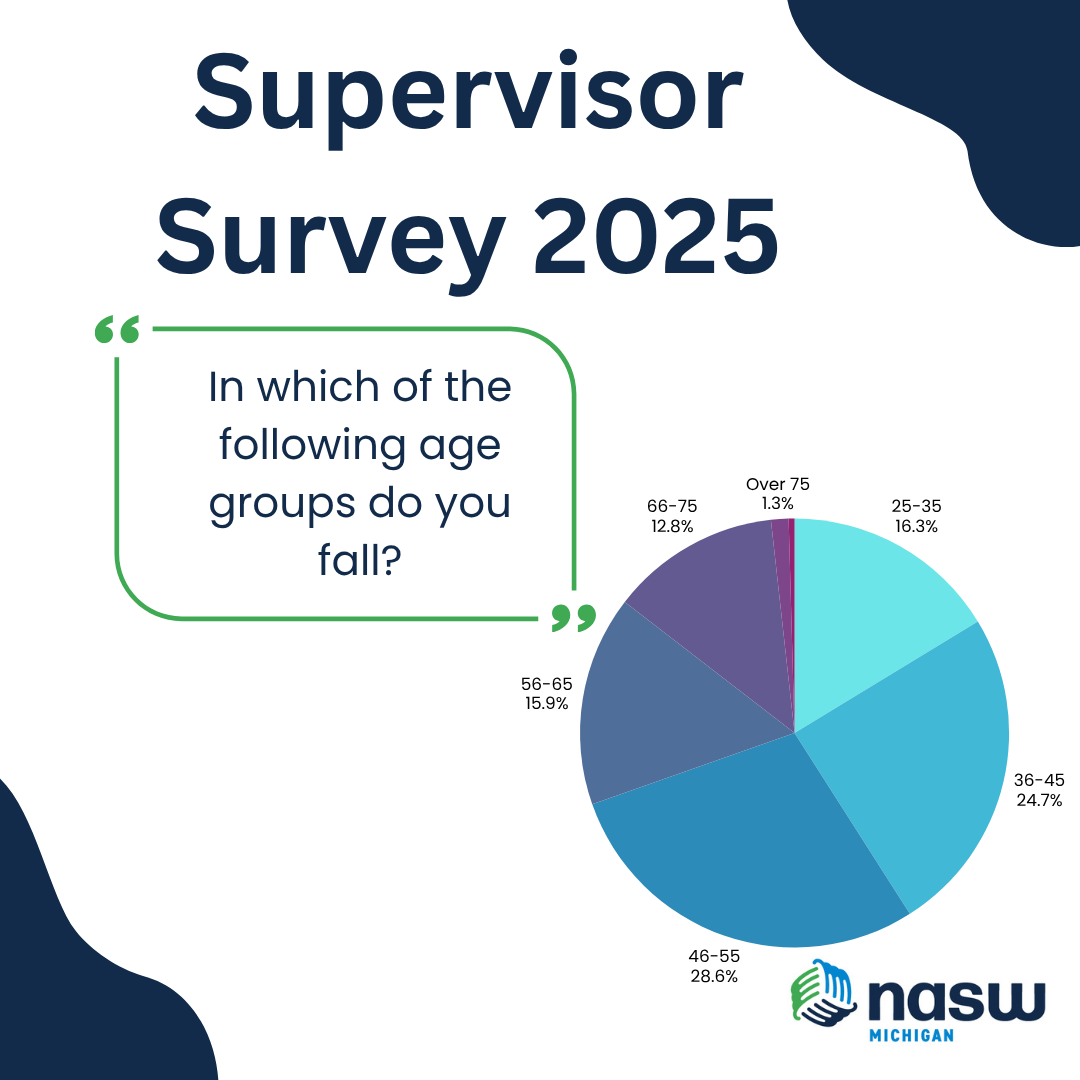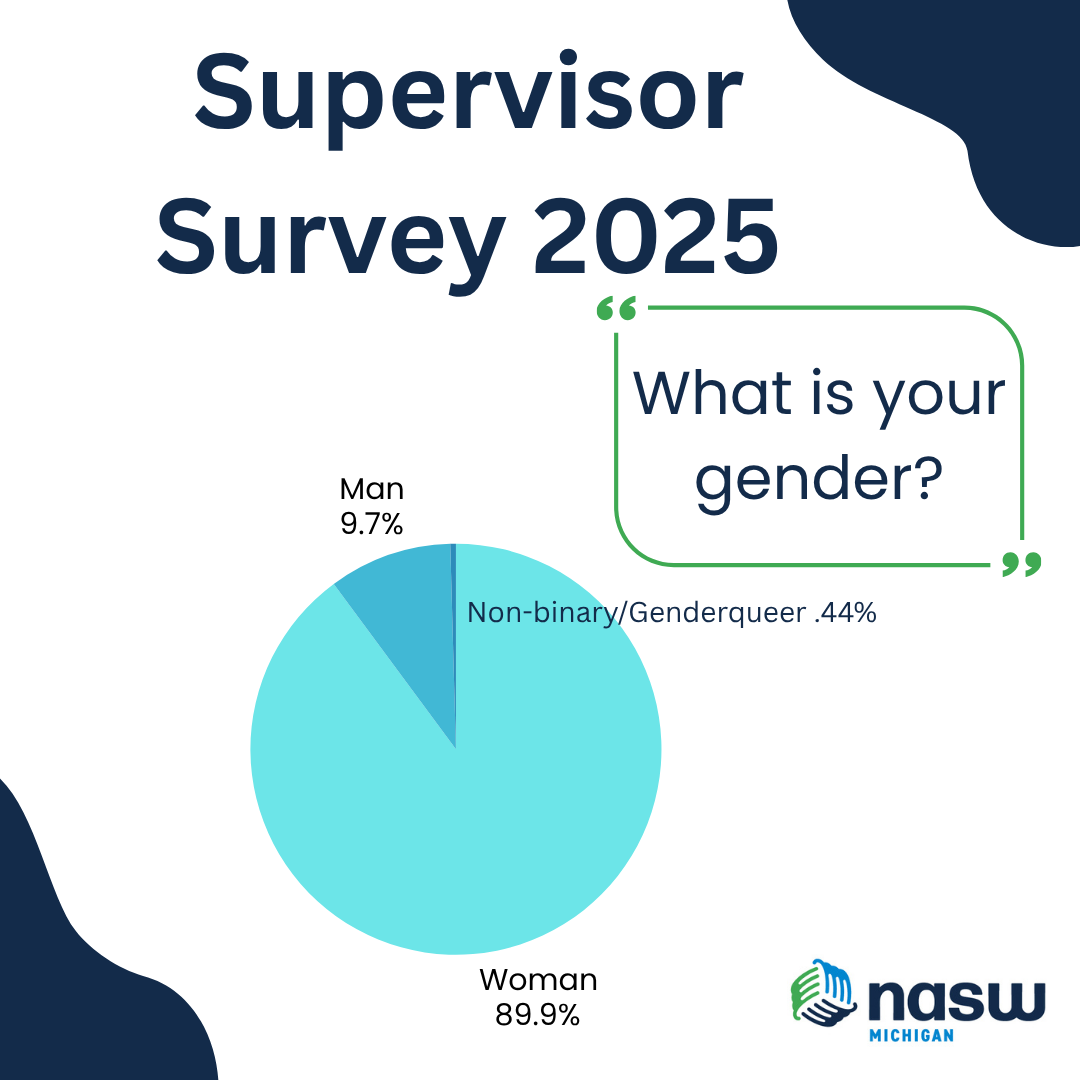2025 Supervisor Survey Recap - Understanding Current Trends in Michigan’s Social Work Supervisors
Tuesday, October 7, 2025
(0 Comments)
2025 Supervisor Survey Recap - Understanding Current Trends in Michigan’s Social Work Supervisors
Over the course of the last winter the Workforce And Working Conditions Subcommittee on Supervision put together a survey for Michigan’s fully licensed social workers who provide (or have provided in the past) licensure supervision. As a very important tier of the licensure modernization work NASW-Michigan is doing, this survey provided valuable insight into what social work supervisors are seeing in practice and what, as the experts, they need or hope to see to strengthen the integrity of social work supervision in Michigan.
The survey was open from early April through mid-June and we received a total of 226 responses. Below are a few graphs that show some of the demographic data we were able to gather from the demographic questions. It was not particularly surprising that the majority of our responses came from licensure supervisors who were white women between the ages of 35-55 who hold a clinical license. Interestingly when asked how long they’ve provided supervision it was pretty equally divided between 1-2 years, 3-5 years, 6-10 years and over 10 years suggesting that there’s a surprisingly even distribution of experience levels providing supervision to licensees.


When asked about what area of social work respondents work in, we received 420 responses which showcases the frequency of social workers to work within multiple specialities or to hold multiple roles concurrently. Respondents were given the opportunity to choose more than one area and also to write in their area of practice in the “other” field. The most frequently chosen areas were;
- Mental Health (133 responses, 32%)
- Private Practice (99 responses, 24%)
- Administration/supervision (47 responses, 11%)
- Health/Medical (34 responses, 8%)
- School Social Work (28 responses, 6%)
Seventy-nine (18%) responses were others such as substance abuse, aging, child welfare, courts/criminal justice, higher education, fundraising, evaluation and homelessness.
We learned that most supervisors typically supervise one-two licensees at a time, though some of our supervisors in Michigan are providing supervision to three or more. The fees that supervisors charge varies widely as about 33% of responders report that providing supervision is part of their job duties and they are paid through their employers. The next highest response was 37 respondents (16%) who report that they provide supervision free of charge. The rest of the respondents report charging anywhere from $25-100 with only a few charging between $100-200 per hour. Determining the appropriate rate to charge for supervision is an important consideration as supervisors balance the ethical call to support and invest in the future of the profession through mentorship with the importance of valuing their time. It is also important for LLMSWs to consider this when they are interviewing and negotiating for employment as whether or not supervision is included could significantly impact the compensation package.
The majority of supervisors give primarily individual supervision though about a third of the respondents reported offering group supervision or doing a combination of the two. LARA’s requirements for supervision state that at least one hour per month must be individual but that the other hours can be group. There is a lot of benefit to group supervision - not only does it provide an opportunity for peer-to-peer connection, it can be more affordable for the LLMSWs while also being as lucrative for the supervisor.
We asked respondents about what, if any, training they had to prepare them for their roles as supervisors. A large majority of the respondents were NASW Core Supervision Trained, which was not surprising as one of the major ways we publicized this survey was by sending it out to the roster of social workers who have completed the Core Supervision Training. This makes this question a little less reliable for giving us the best snapshot of how much training the typical social worker providing supervision in Michigan may have; however, many respondents did report that they had no formal training so we know that our survey did reach many social workers through other outreach including member emails, the NASW-Michigan conference and our social media platforms. Other commonly reported trainings included various courses taken through the schools of social work in Michigan and many social workers reported that their employers provided leadership/supervision training for them. 11% of respondents reported having no formal training in supervision. When asked what they would be willing to pay for a supervision training a majority (66%) of respondents felt that $200 or less would be a reasonable rate for this type of training while 17% of respondents reported that they would not be willing to pay for a training in supervision. A handful of providers suggested that they would be willing to pay between $200 and over $300 for training.
When asked to reflect on challenges associated with providing supervision to LLMSWs outside of the LMSWs agency the top responses were related to logistics, assessing for a good fit between supervisor and supervisee and setting appropriate boundaries and expectations. It’s worth noting that this was a question where respondents could answer with more than one answer and that the most frequent response was that they don’t provide supervision outside of their agency. The rest of the respondents who reported challenges often choose more than one, showing that this can be a tricky dynamic for supervisors.
Finally, the last question was an open-ended question that asked respondents to offer any other recommendations they have related to the supervision process. Thankfully most respondents did provide some feedback in their own words. The three themes that stuck out the most from this open-ended question were related to the following:
1. Support for more training for supervisors
2. The difficulty with charging for supervision; supervisors discussed feeling conflicted because of our code of ethics that calls on us to invest in the social work profession and the general tendency for social workers to be giving with needing to be mindful of the value of their time as well as comments related to difficulty being connected to LLMSWs who need supervision services
3. The importance of LLMSWs to understand the purpose and expectations related to supervision and specifically that most supervision does not incorporate preparation for the ASWB exam
As NASW-Michigan all three of these themes feel actionable. As we continue to develop a recommendation to strengthen supervision standards in Michigan, we feel supported by these answers that supervisors who are already out there doing the work agree that a training requirement and access to trainings on supervision would be beneficial. We are brainstorming ways to continue to connect LLMSWs with supervisors and already do this with the Michigan Social Work Supervision Directory that can be found here. Finally, we want to continue to promote awareness in the social work community on what supervision is and isn’t. Some other themes that came out in open-ended answers were:
- Acknowledgement of how much supervisors gain from providing hands-on help to LLMSWs and watching new members of our profession gain confidence and develop a sense of self-worth
- The need for more macro-supervision focused materials and macro-licensed supervisors in general
- While this survey was not meant to address the issues associated with the ASWB exam, many supervisors noted this in this open-ended question
- The concern of the cost of trainings and general cost of supervision being put onto supervisors and LLMSWs who are paying for supervision
Thank you again to all of the supervisors who participated in our survey and helped us collect such important feedback. If you are particularly interested in supervision and helping us develop standards related to strengthening supervision standards we invite you to join us at the monthly Workforce & Working Conditions Meetings where the Supervision subcommittee continues to work on these important topics. We meet on the fourth Thursday of the month from 12-1 and you can join by completing this interest form.
|